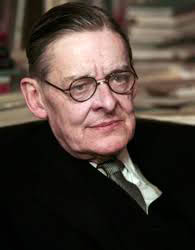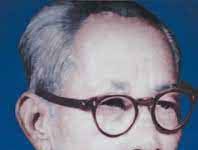T S Eliot-Brief Biography
T S Eliot
T S Eliot-Brief Biography
T S Eliot (Thomas Stearns Eliot) was a great literary figure of the twentieth-century world who began his writings with innovation both in theory and practice and became a worldwide renowned poet, dramatist, and critic and himself became an institute for many.
Thomas Stearns Eliot, briefly T.S. Eliot, was born on 26th September 1888 in St. Louis, Missouri, an industrial city in the centre of the U.S.A. His ancestors, on his father’s side, had migrated to America in 1668 from East Coker in Somersetshire, England. His father; Henry Ware Eliot, was a businessman in Brick Trade in St. Louis in which he was very successful. His grandfather was a Unitarian minister who founded the Washington University at St. Louis. Eliot’s mother, Charlotte Chauncey Stearns was a woman of literature and wrote romantic poetry.
The child Eliot was first sent to a day school at St. Louis where he studied till 1905 and he completed his preparation for college at the Milton Academy in Massachusetts. At school, he showed a good career and proved himself to be a brilliant student and in 1900 won a gold medal for Latin. During this time of schooling, he began his writing and showed a marked technical proficiency and a sense of humour.
In 1906 T S Eliot entered Harvard University where he pursued a wide-ranging course of studies in language and literature as—the classics, German, French and English. It seemed that he had a keen interest in the comparative study of literature. His two teachers—Irving Babbit and George Santayana, influenced him profoundly. Around 1908, he read Arthur Symon’s book the Symbolist Movement in Literature and was largely inspired by French Symbolist poets, especially by Laforgue, Baudelaire, Mallarme and Corbiere.
In 1910 T S Eliot graduated from Harvard and being fascinated by the French Symbolist poets, he went to France and spent a year at Sorbonne University in Paris, studying widely in many contemporary writers. From Paris, in 1911, he went to Germany and came into contact with many German writers and their works. Then he returned to Harvard and studied philosophy, particularly Indian literature and Indian philosophy. He studied Sanskrit literature under Lehmann and the Vedas under a German teacher. He studied Indian philosophy under J.H. Woods and was much inspired and influenced by Hindu philosophy. In 1913 he was elected the president of the “Harvard Philosophical Club”. The very next year, he undertook another trip to Germany to continue his philosophical study there. But with the outbreak of the First World War, he left Germany and went to England and pursued his study at Oxford till 1915. There he took the job of a school teacher to meet his finance. Already, during his Harvard day, he took a thesis to be completed for the doctorate degree and from England he submitted his thesis paper on the philosophy of Bradley, but never went to Harvard to receive the degree. In London, in 1914 he met Ezra Pound, a great poet and through him he began to be well-known in England and by Pound, he was considerably inspired to go on with his writing. In July 1915 he entered into a marriage bond with an English girl by the name of Vivienne Haigh and began to live in London permanently.
In 1917 T S Eliot gave up his job as a schoolmaster and entered the foreign department of Lloyds Bank, where he worked till 1925. During this period he wrote, especially verses, vigorously and several times became ill with overwork. Besides this, he worked as an assistant editor of ‘The Egoist’ from 1917 to 1919 and in 1923 he became the editor of The Criterion which he continued to edit till the outbreak of the 2nd World War. In 1925 he entered the new publishing company “Faber and Faber” and soon became the director and he worked in it till his last day. Already in 1922, he published his well-known book of poetry “The Waste Land” which drew the public welcome.
After the First World War, his outlook toward life and the human condition on the earth became more and more realistic, pessimistic, gloomy and philosophic and in his writing, all these outlooks began to fall vigorously.
In 1927 T S Eliot became a British citizen and joined the British Church that very year. The event marked an epoch in his career as his poem after this event began to be more religious and philosophic. Hence his reputation began to grow here and there and during his heyday as a poet, he paid a short visit to Harvard in 1933, to lecture there as a visiting professor. At this time, Eliot became interested in drama and began to write poetic dramas with a new theory and along with writing poetry and drama, he took to writing criticism under his own innovative theory.
Hence his fame and reputation as a poet, dramatist and critic began to glow worldwide and won recognition as one of the great literary figures of the century. He visited the U.S.A. several times as visiting professor and continued to write his essays and articles up to his death. After the recognition of his genius, he was awarded the Nobel Prize for literature in 1948 and The British Order of Merit, and many other International distinctions. In 1947 his first wife Vivienne Haigh died and then he married his private secretary, Miss Valerie Fletcher. His second wife had been his best companion till his last days who nursed him very affectionately when he fell ill in 1964. In 1965 he died and with him, a prolific and versatile genius of the twentieth-century literary world came to an end. He was buried in the little village of East Coker in Somerset from where ancestor Andrew Eliot had migrated to the U.S.A. in 1668.
T S Eliot had a cosmopolitan personality. He was born in America and lived in England; traveled to France, and Germany and widened his experience. He had a simple but attractive personality for which he could attract the attention of all that came to his contact. He presented himself in a British manner with an umbrella, striped trousers and a bowler hat. He liked English cheese very much. He had a religious heart and was accustomed to living a simple and moderate life which might be a good idea for many. Physically he was tall, pale, thoughtful, absorbed, and speaking in a measured and solemn tone, even when he was humorous.
As he was a poet, dramatist and critic, so his writings fall into three categories: poetry, drama and criticism. His poems were a new thing in the history of twentieth-century poetry. His poems are mainly the representation of his contemporary society. As complex was the age so complex was his poetry. His language is simple and prosaic but his imagery and symbols made his poetry complex. The Wasteland is a poem that illustrates the typical characteristics of his poems. There is a marked presence of mysticism and a note of religion with conflict both external and internal in many of his best poems.
His second career is in plays that is called twentieth-century poetic plays. T S Eliot took to writing plays with his own theory. His poetic plays are far more different than that of the Elizabethan Playwrights. His poetic plays are based on realism but their language is neither prose nor poetry. As a dramatist could achieve less success but as a theory giver of poetic plays, he was successful because by his theory of poetic play he popularized his new genre of poetic plays in the age of prose. He wrote six poetic plays The Murder in the Cathedral (1935), The Cocktail Party (1950), and The Family Reunion (1939) are the stamps of his genius as a playwright. But it is a matter of sorrow that his plays were less successful on the stage.
The third phase of his writing is criticism, especially literary and theoretical. As a critic, he was realistic and broke down all the previous and prevailing theories of criticism. His criticism was varied as he criticized the Elizabethan poets and dramatists as well as the metaphysical poets of the 17th century. His criticisms done on Dante and other classical writers are inspiring. As a critic and writer of prose, his language and manner of representation were lucid, analytical, and argumentative.
As a critic, not as a poet and dramatist, his place is higher than his contemporaries, because many, after him have taken up his principles in criticizing literature. 0 0 0
T S Eliot
N.B. The article ‘T S Eliot-Brief Biography’ originally belongs to the book ‘The World Writers-Brief Biographies‘ by Menonim Menonimus.
T S Eliot
Books of Composition by M. Menonimus:
- Advertisement Writing
- Amplification Writing
- Note Making
- Paragraph Writing
- Notice Writing
- Passage Comprehension
- The Art of Poster Writing
- The Art of Letter Writing
- Report Writing
- Story Writing
- Substance Writing
- School Essays Part-I
- School Essays Part-II
- School English Grammar Part-I
- School English Grammar Part-II..
Books of S. Story by M. Menonimus:
Related Search:











